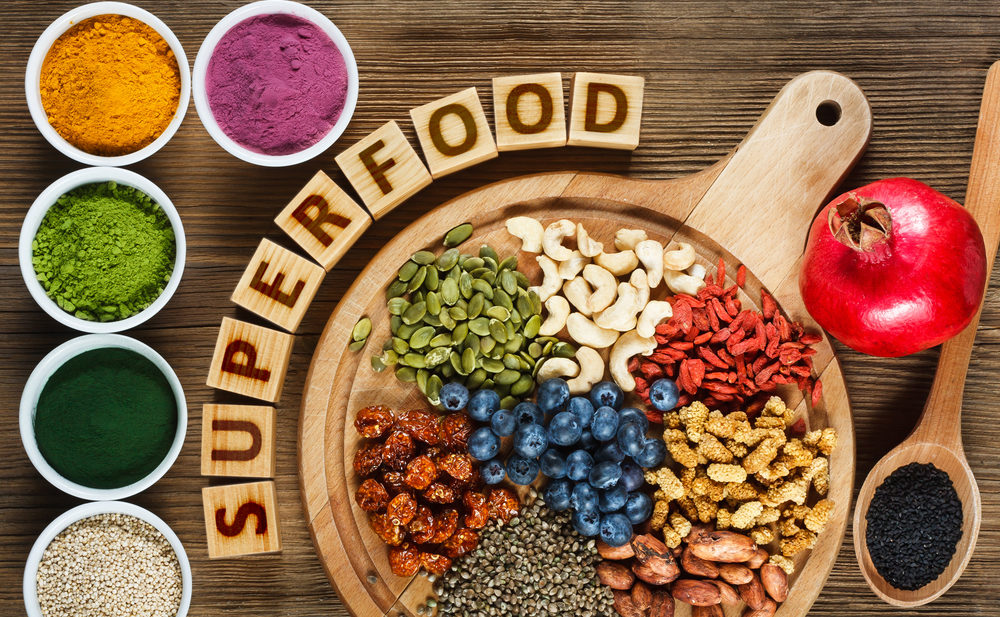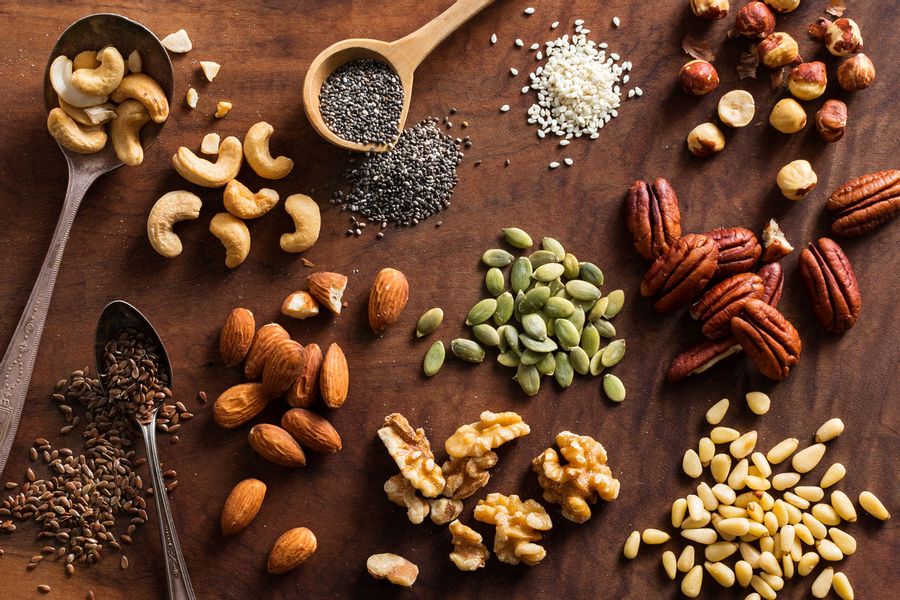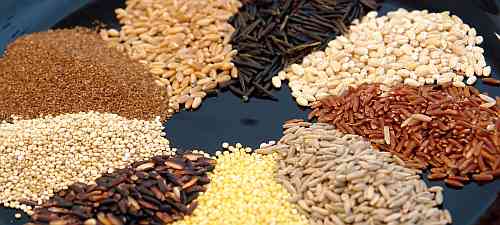The term "superfood" is a fairly new term referring to foods that provide minimum calories with maximum nutritional benefit. They're packed with minerals, vitamins, and antioxidants.
At this time, no standard criteria or legal definitions are
classifying any food as a superfood. Most of the superfoods are plant-based.
The food industry is awarding the superfood label to
nutrient-rich foods with a supposed ability to have a positive effect on
health.
Although many foods can be described as super, it's
important to understand that there is no single food that holds the key to good
health or prevent disease.
Here are 20 Superfoods that you should include in your daily diet.
Superfood List
#1 Berries
Berries are often called as nutrition powerhouse of
vitamins, minerals, fiber, and antioxidants.
This superfood has a strong antioxidant capacity which helps
to reduce the risk of heart disease, cancer, and other inflammatory conditions.
Berries can also be effective in the treatment of various digestive and immune disorders when used in combination with traditional
medical treatments.
While all of them differ in nutritional value, blackberries,
cranberries (the fresh, not dried, variety), strawberries and raspberries, to
name a few, are low in calories, high in fiber, and packed full of antioxidants.
Whether you enjoy them as part of your breakfast, as a
dessert, on a salad or in a smoothie, berries' health benefits are as versatile
as their culinary uses.
#2 Dark Leafy Greens
Dark leafy greens are an excellent source of nutrients
including folate, zinc, calcium, iron, magnesium, vitamin C, and fiber.
Their potential to reduce the risk of chronic diseases including
heart disease and type 2 diabetes are part of what makes them so important.
Try spinach varieties, such as swiss chard, kale, collard
greens, or mustard greens. Throw them into salads or sauté them in a small
amount of olive oil. Soups and stews may also be added to greens.
#3 Tea
Tea helps to hydrate, low in calories, and is a good source
of antioxidants.
Powerful antioxidants found mainly in green tea, catechins
have beneficial anti-inflammatory and anti-carcinogenic properties.
A study published in the Journal of Physiological
Anthropology investigated the effects of green tea, white tea, and water
consumption in 18 students on stress levels.
The study suggested that both green and white tea had lower levels of stress, and that white tea
had an even greater impact. Larger studies are needed to confirm this potential
benefit to health.
#4 Nuts and Seeds
This superfood also pack different compounds of plants with
anti-inflammatory and antioxidant properties which can protect against
oxidative stress.
Research suggests eating nuts and seeds may have a
protective effect on heart disease.
Common nuts and seeds are:
- Almonds, pecans, pistachios, walnuts, cashews, Nuts from Brazil, nuts from macadamia.
- Peanuts-a legume technically, but often considered a nut.
- Sunflower seeds, pumpkins seeds, chia seeds, flaxseeds, and hemp seeds.
Interestingly, although nuts and seeds are calorie-dense,
certain types of nuts are associated with weight loss when included in a
balanced diet.
#5 Eggs
Because of their high cholesterol content, eggs have
historically been a controversial topic in the nutrition world but remain one
of the healthiest foods.
Whole eggs, including B vitamins, choline, selenium, vitamin A, iron, and phosphorus, are rich in many nutrients.
They're loaded with high-quality protein.
Eggs contain two potent antioxidants, zeaxanthin and lutein,
known for protecting the vision and health of the eyes.
Despite fears about egg consumption and high cholesterol,
research shows no measurable increase in the risk of heart disease or diabetes from
eating up to 6–12 eggs a week.
#6 Fish
Fish can be a good source of omega-3 fatty acids and protein
which may help prevent heart disease.
Salmon is a highly nutritious fish which contains healthy
fats, protein, B vitamins, potassium, and selenium.
It is one of the best sources of omega-3 fatty acids, known
for a range of health benefits such as inflammation reduction, reduce your risk
of heart disease and diabetes.
Purchase fresh, frozen, or canned fish. Fish are salmon,
tuna steaks, mackerel, herring, trout, anchovies, and sardines with the highest
omega-3 content.
#7 Legumes
Pulses or legumes are a class of plant foods consisting of
beans (including soy), lentils, peas, peanuts, and alfalfa.
They earn the label of superfood because they are loaded
with nutrients and play a role in the prevention and management of different
diseases.
Legumes are a rich source of vitamins from B, different
minerals, protein, and fiber.
Research indicates that they offer many health benefits
including improved management of type 2 diabetes, and reduced blood pressure
and cholesterol.
Eating beans and legumes regularly, due to their ability to
improve feelings of fullness, may also promote healthy weight maintenance.
#8 Yogurt
Try to eat more yogurt but watch out for fruity or flavored
yogurts with lots of added sugar. The best yogurt is a home set one.
But if you are buying from the market then buy plain yogurt
and have your own fruit added. Look for yogurts with "live active
cultures," like Lactobacillus, L. Acidophilus, with L. Bulgaricus, and
with S. THERMOFIL.
You can use yogurt in dips or sauces, instead of mayonnaise
or sour cream.
#9 Garlic
Garlic is a plant food closely associated with onions,
leeks, and shallots. It is an excellent source of manganese, vitamin C, vitamin
B6, selenium, and fiber.
Garlic is a popular culinary ingredient due to its distinct
flavor but has been used for centuries as well for its medicinal benefits.
Research suggests that garlic can reduce cholesterol and
blood pressure and support immune function.
The sulfur-containing compound in garlic may even play a
role in the prevention of certain types of cancer.
#10 Olive Oil
Olive oil is a natural oil extracted from olive trees and
one of the Mediterranean diet's key elements.
Its high levels of monounsaturated fatty acids (MUFAs) and
polyphenolic compounds are the major claims of health.
Adding olive oil to your diet can reduce your risk of
inflammation and certain illnesses such as heart disease and diabetes.
It also contains antioxidants such as vitamins E and K which
can protect against oxidative stress from cell damage.
#11 Ginger
Ginger originates from China's flowering plant root. It is
used both as a gastronomic flavor enhancer and for its multiple medicinal
effects.
Ginger root contains antioxidants, such as gingerol, which
maybe responsible for many of the health benefits reported associated with the
food.
Ginger may be effective for nausea management and pain
reduction from acute and chronic inflammatory conditions
It can also lower your risk of chronic diseases like heart
disease, dementia and certain cancers
Ginger is available fresh, in dried/ powdered form, as an
oil or juice.
Include it in your soups, stir-fries, sauces, and teas for
maximum benefits.
#12 Turmeric (Curcumin)
Turmeric is a bright yellow spice that is closely connected
with ginger. It originated in India and is used for cooking and its medicinal benefits.
Curcumin is the active Turmeric compound. It has a powerful
antioxidant and anti-inflammatory effects and is the main point of most
research on turmeric.
Studies demonstrate that curcumin can be effective in the
treatment and prevention of chronic diseases like cancer, heart disease and
diabetes.
It may also help to cure wounds and reduce pain. Haldi Milk
or Golden Milk is a famous Indian drink.
#13 Whole Grain
But you don't need to overthink it to gain the benefits of
the grains. Simply select whole grains over refined ones.
Barley, bulgur wheat, brown rice, and oats are also common
whole grains with the entire nutrition package.
#14 Avocado
Avocado is a highly nutritious fruit though in culinary
applications it is often treated more like a vegetable.
It is rich in numerous nutrients, including fiber, minerals,
vitamins and healthy fats.
Avocado is high in monounsaturated fats (MUFAs), much like
olive oil. Oleic acid is the most prevalent MUFA in avocado which is associated
with reduced body inflammation.
Eating avocado can reduce your risk of heart disease,
diabetes, metabolic syndrome, and some cancers.
#15 Mushrooms
Although the nutrient content varies depending on the type, mushrooms
contain vitamin A, potassium, fiber, and several antioxidants.
Interestingly, eating more mushrooms is associated with
increased vegetable consumption in general, which contributes to a more
nutritious diet overall.
Mushrooms can also play a role in reducing inflammation and
in preventing certain types of cancer due to their unique antioxidant content.
Agricultural waste produced from mushrooms is used to grow
them. This makes mushrooms a sustainable constituent of a healthy food system.
#16 Sweet Potato
The sweet potato is a root vegetable full of nutrients
including potassium, fiber, and vitamins A and C.
They are also a good source of carotenoids, a type of
antioxidants that can lower the risk for certain cancers.
Sweet potatoes, despite their sweet flavor, do not increase
blood sugar as much as you might expect. Interestingly, in those with type 2
diabetes, they could actually improve blood sugar control.
#17 Seaweed
Seaweed is a term used to describe certain sea vegetables
that are rich in nutrients. It is most commonly consumed in Asian cuisine but
is gaining popularity through its nutritional value in other parts of the
world.
Seaweed packages several nutrients including vitamin K,
folate, iodine, and fiber.
These ocean vegetables are a source of unique bioactive
compounds that may have antioxidant effects – not typically present in
land-vegetables.
Some of these compounds may also decrease your cancer risk,
heart disease, obesity, and diabetes.
#18 Pomegranate
Pomegranates are amongst Earth's healthiest fruits.
Research shows that pomegranates can boost heart health, and
make a good candidate for dietary supplements that could prevent cardiovascular
disease, according to an article published in Frontiers in Pharmacology in May2018.
#19 Dark Chocolate
Research has shown dark chocolate is high in flavonoids.
Flavonoids show antioxidant activity, prevent heart disease and certain
cancers, and boost the immune system.
The component specifically responsible for these benefits in
chocolate is cacao powder. Manufacturers derive this from beans made from
cacao.
Keep in mind that chocolate may have added ingredients that
could negate these benefits, such as added sugar. Always go for a high cocoa
content chocolate bar.
#20 Soy
Some research has shown that soy isoflavones help lower
the amount of low-density lipoprotein (LDL) or "bad" cholesterol in
the blood.
Studies have shown that soy may prevent memory loss associated with aging. Soy
isoflavones may also reduce bone loss and increase bone mineral density during
menopause, as well as decrease the symptoms of menopause.
TakeAway
There is more to achieving optimal health through food and
nutrition than focusing on one or two of the latest food trends.
Instead, eating a variety of nutritious foods each day best
supports good health.
Including some or all of the foods on this superfood list
may benefit your overall health as part of a balanced diet and may prevent
certain chronic diseases.
Follow The Healthy Pinch on Instagram.






Comments
Post a Comment